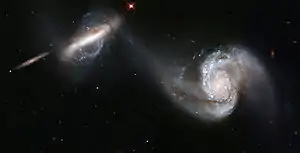Arp 87
Arp 87 (also known as NGC 3808) is a pair of two interacting galaxies, NGC 3808A and NGC 3808B. They are situated in the Leo constellation. NGC 3808A, the brighter, is a peculiar spiral galaxy,[2] while NGC 3808B is an irregular galaxy.[3]
| NGC 3808A | |
|---|---|
 A visible light image of NGC 3808A (right) and 3808B (left). Credit: NASA/HST. | |
| Observation data (J2000 epoch) | |
| Constellation | Leo |
| Right ascension | 11h 40m 44.4s[1] |
| Declination | +22° 26′ 16″[1] |
| Redshift | 0.023726[1] |
| Helio radial velocity | 7113 km/s[1] |
| Apparent magnitude (V) | 14.1[1] |
| Characteristics | |
| Type | NGC 3808A: SAB(rs)c? pec[2] I0? pec[3] |
| Apparent size (V) | 2.5′ × 0.8′[1] |
| Other designations | |
| NGC 3808, UGC 6643[1] NGC 3808A: MCG+04-28-021, PGC 36227[2] NGC 3808B: MCG+04-28-020, PGC 36228[3] | |
The two galaxies were discovered on 10 April 1785 by William Herschel. The two are located about 330 million light-years (100 megaparsecs) away from the Earth.[4] Arp 87 was observed by the Hubble Telescope in 2007, which revealed massive clouds of gas and dust flowing from one galaxy to another. Additionally, both galaxies appear to have been distorted.[5]
See also
References
- "NED results for object ARP 187". NASA/IPAC Extragalactic Database. National Aeronautics and Space Administration / Infrared Processing and Analysis Center. Retrieved 21 April 2018.
- "NED results for object NGC 3808A". NASA/IPAC Extragalactic Database. National Aeronautics and Space Administration / Infrared Processing and Analysis Center. Retrieved 21 April 2018.
- "NED results for object NGC 3808B". NASA/IPAC Extragalactic Database. National Aeronautics and Space Administration / Infrared Processing and Analysis Center. Retrieved 21 April 2018.
- Seligman, Courtney. "New General Catalogue objects: NGC 3800 - 3849". cseligman.com. Retrieved 21 March 2018.
- "Arp 87 | ESA/Hubble". www.spacetelescope.org. 2007. Retrieved 21 March 2018.
External links
 Media related to NGC 3808 at Wikimedia Commons
Media related to NGC 3808 at Wikimedia Commons- "Spiraling tentacles of galactic doom!". Discover Magazine Blogs. Discover Magazine. 2007.
This article is issued from Wikipedia. The text is licensed under Creative Commons - Attribution - Sharealike. Additional terms may apply for the media files.